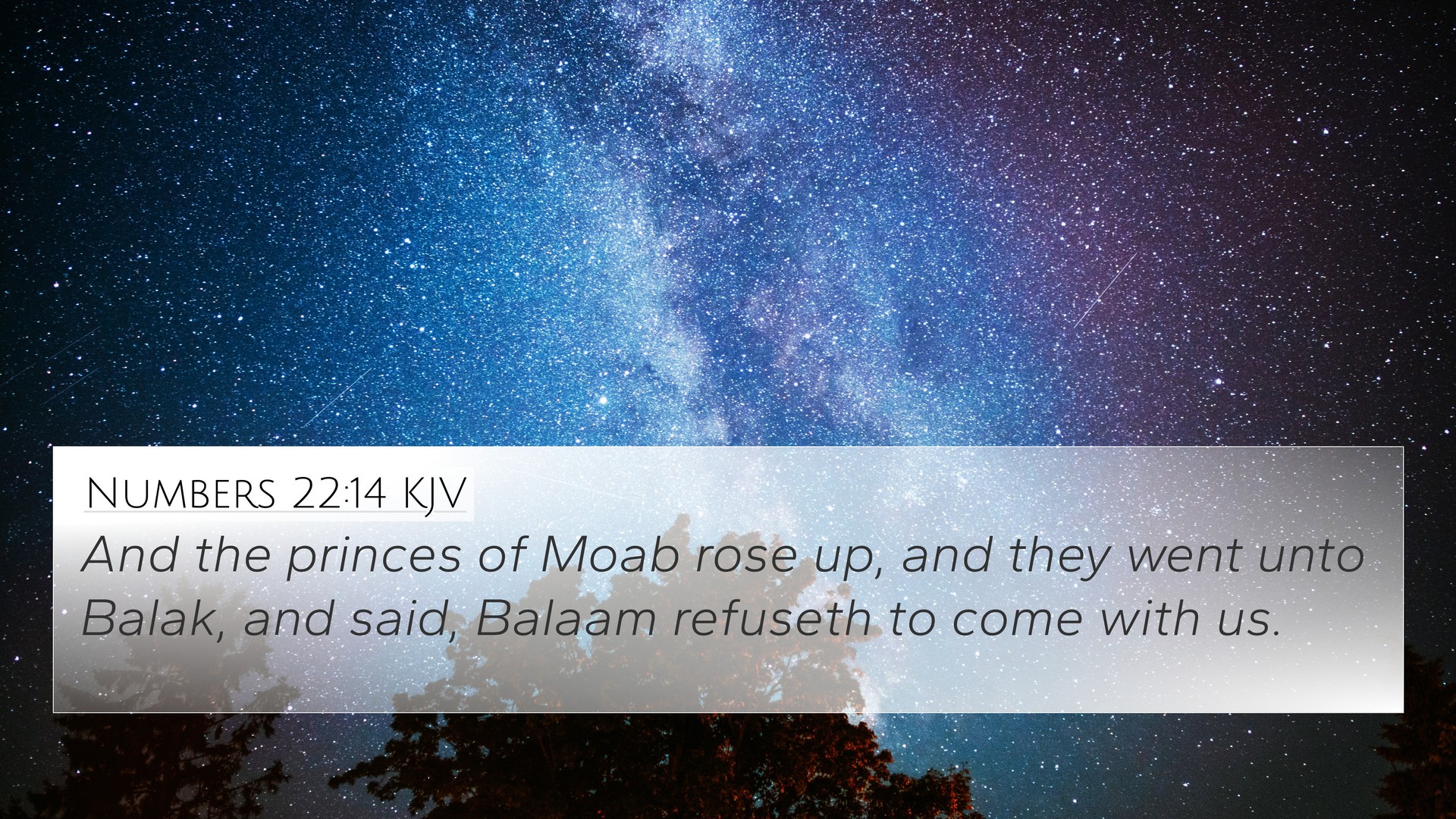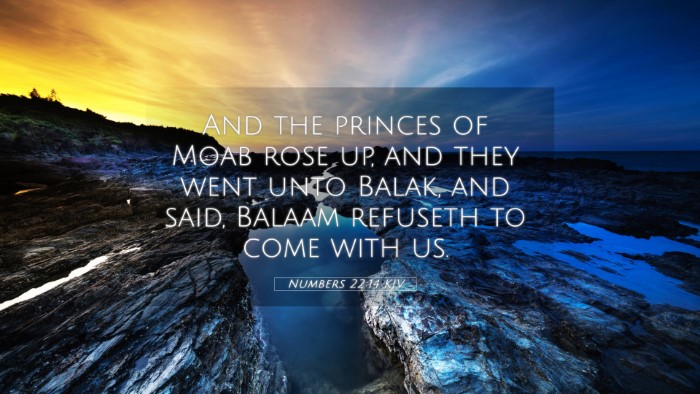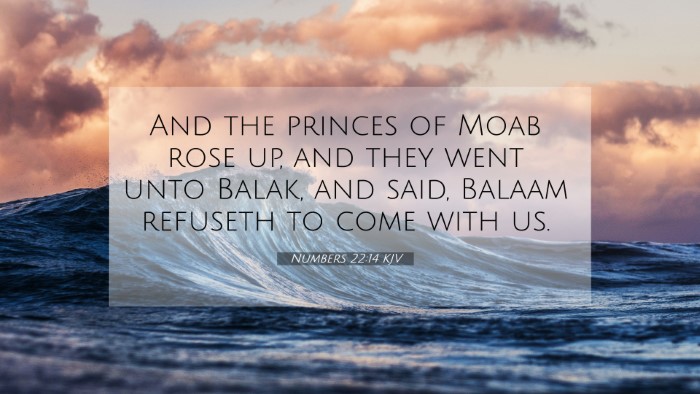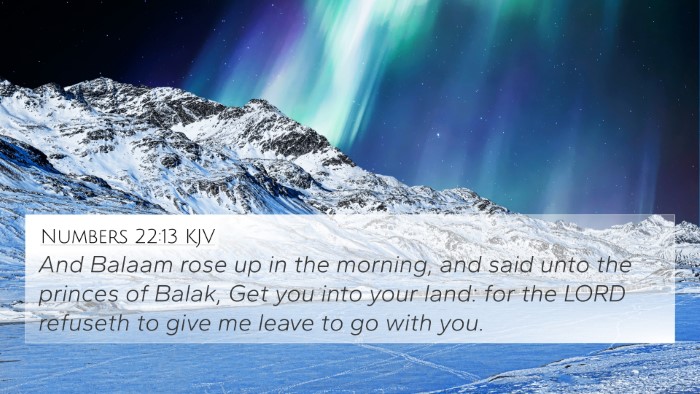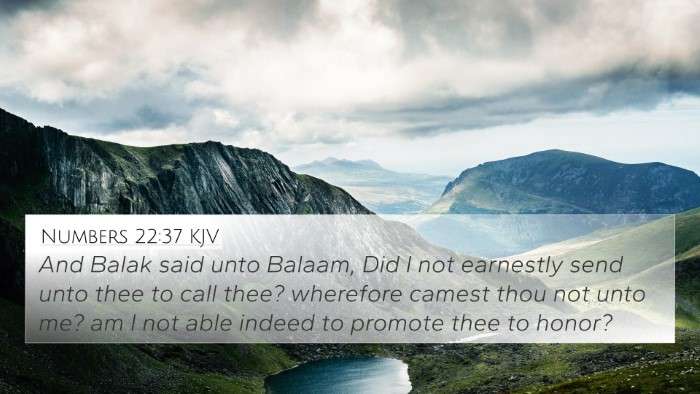Understanding Numbers 22:14
Numbers 22:14 states: "And the elders of Moab and the elders of Midian departed with the rewards of divination in their hand; and they came unto Balaam, and spake unto him the words of Balak." This verse provides a glimpse into the dealings between Balak, King of Moab, and Balaam, a diviner. The passage highlights themes of prophecy, divine will, and the consequences of seeking guidance from sources outside of God.
Context and Overview
The story revolves around Balak's desire to curse the Israelites, which he believes will protect his kingdom from them. In this context, Numbers 22:14 reveals the means by which Balak attempts to achieve his goals. The elders of Moab and Midian come with rewards for Balaam, showing a reliance on divination—a practice typically viewed unfavorably in Scripture.
Insights from Public Domain Commentaries
-
Matthew Henry:
Henry explains this verse as an example of how worldly leaders may turn to ungodly counsel when faced with a threat, reflecting a lack of faith in God. He highlights the moral implications of seeking guidance through divination instead of prayer and reliance on God’s counsel.
-
Albert Barnes:
Barnes emphasizes Balak’s desperation and his misguided reliance on Balaam's abilities as a seer. He discusses how the act of sending elders signifies a formal approach to seeking favor with a potential agent of divine will, illustrating the interplay between human action and divine control.
-
Adam Clarke:
Clarke views this verse in light of the spiritual dynamics at play, noting that while Balak seeks to manipulate the situation through Balaam, God's sovereignty cannot be undermined. Clarke points out that the rewards offered indicate the seriousness of Balak's intentions, yet highlight the futility of opposing God's plans.
Thematic Connections
In examining Numbers 22:14, we can draw connections to several biblical themes:
-
Divine Sovereignty:
This verse showcases God’s control over the events as He ultimately thwarts Balak’s plans through Balaam’s later revelations.
-
Faith vs. Divination:
The reliance on divination instead of faith in God offers a critical lesson on the dangers of seeking knowledge from sources outside of divine instruction.
-
The Role of God’s Chosen People:
Israel's significance is underscored, reflecting their position as recipients of God's blessing amidst the opposition they face.
Cross-References and Related Verses
Here are some Bible verses that relate to Numbers 22:14:
- Deuteronomy 23:4-6 - God’s prohibition against Moabite interference with Israel.
- Isaiah 47:12-15 - Condemnation of divination and sorcery.
- Micah 6:5 - Remember the wickedness of Balak and the plans he devised against Israel.
- Revelation 2:14 - Reference to Balaam's teachings as a parallel to the temptations facing the Church.
- Hebrews 11:20 - Faith demonstrated through a belief in God's promises against opposition.
- 2 Peter 2:15 - A warning against following the way of Balaam for profit.
- Numbers 23:8 - Balaam declaring that he cannot curse what God has blessed.
Application and Reflection
Numbers 22:14 teaches valuable lessons on the importance of faithfulness to God over worldly wisdom. It warns against the temptation to seek guidance in places lacking divine endorsement.
In today’s context, individuals can reflect on their decision-making processes and consider whether they are rooted in prayer and God’s Word or if they are turning to worldly wisdom as a substitute for divine counsel.
Conclusion
In summary, Numbers 22:14 is not merely a historical account; it offers profound insights that resonate through the Scriptures:
- The necessity of surrender to God's will.
- The futility of divination and seeking ungodly counsel.
Understanding the connections between this verse and the wider biblical narrative enhances our comprehension of God's sovereignty and the faithfulness expected from His people.
